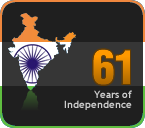
With the last beats of the dhak the annual ritual of an ornate farewell is well complete. Life will settle down to trace its daily course amidst the settling dust from past revelries now. The dismantled bamboo-work and torn down banners still bear testimony to the joyous uproar that it was party to for a few days more. Lakshmi pujo will set in, and Kali-pujo/ Diwali will soon follow. The Bangali bhodrolok will go back to the chores of his office as will the reluctant housewife, albeit with a sigh of grudging acceptance.
But, amongst all these tell-tale signs of morose dejectedness there will be the slightest flicker of hope. ‘The hope’ of seeing off the coming eleven months in a hurry. ‘The hope’ of welcoming Maa back into her parental abode. ‘The hope’ that springs eternal in every Bengali heart and makes them sustain the rigors of a tortuous year with abiding tolerance.
Observing through the skeptic’s glasses, when the pandal-hopping child in me occasionally rested on a chair to catch his breath and wet his throat, I observed a series of monumental changes setting into our festivities, almost unnoticed.
As some of my friends observed during our Pan-Kolkata Thakur-dekhaa – expeditions,
“Boddo commercial hoye jachhe puro bepaarta.”
I stood in opposition to this vein of thought. I was emphatic on the point that Durga Pujo , like any other event of such scale and participation, needed funding. It’s only our economy that has got to do with the corporates having all the money and so they are bound to get roped in if BIG MONEY is to be spent. And money always means advertisements and commodification.
No denying this fact.
But, Big Money does not necessarily mean less of bhakti. The latter connects to an individual on a personal, more intimate level, having nothing to do with the pomp and show. Of course a sense of enthusiasm coupled with commerce may cloud the solemn ambience that a traditional pujo may have enjoyed in the past. But, good things always come at a cost. Don’t they?
I wonder if the smug tradition-ist would be better off enduring the sight of a dying Sarbojonin-pujo in a dilapidated pandal, reeking of a whimpering budget. I might sound profane in directly connecting wealth to worship, but I have my theory. Agreed that ‘the spirit’ cannot be caged within the confines of ‘want’, but when one has the opportunity to aggrandize, why not make the most of it?
But, my friends too have a valid point when their arguments are dissected in the light of reason and pragmatic foresight. I could sense a deep suspicion emanating out of their skepticism in ‘Corporatization of Pujos’. There looms large a possibility that our next generation would be treated to ‘theme-pujos’ where the idol and her iconic symbolism is lost in the dazzle of the decor or the minutiae of the art-work in the mandap. People might not even offer a cursory look of reverence to the devi , engrossed in the frivolities the adjoining fair would offer. At the thought of such a grim possibility I shudder with appalled apprehension.
Like always ‘A Middle Path’ seems to be the way to go. Money should be allowed to dominate the proceedings up till a certain extent and no more. Demarcation of commerce and piety should be stark and clear.
For wealth is only a currency of commodity, but prayer a path to peace.
Shuvo Bijoyaa !!!!



3 comments:
I am guilty. I am badly guilty. I was busy commenting on Harry Potter's scarless statue until harshly reminded that there was a Goddess right in front of me. But I had been too occupied photographing unicorns and hippogriffs to notice her.
And, yes, its the hope which actually pulls us through. Sometimes, I think, for a Bengali, life is actually about rushing from last year's pujo to next year's pujo. Nothing else in between could ever matter more.
# Correct !!! :)
Very interesting take there on the Puja season in Bengal and its lasting impact on the Bengali psyche; you have also forcefully analysed the commercialization that goes on even in the Bhakti sphere! I would gladly agree with you when you say, "..wealth is only a currency of commodity, but prayer a path to peace." dilipk
Post a Comment